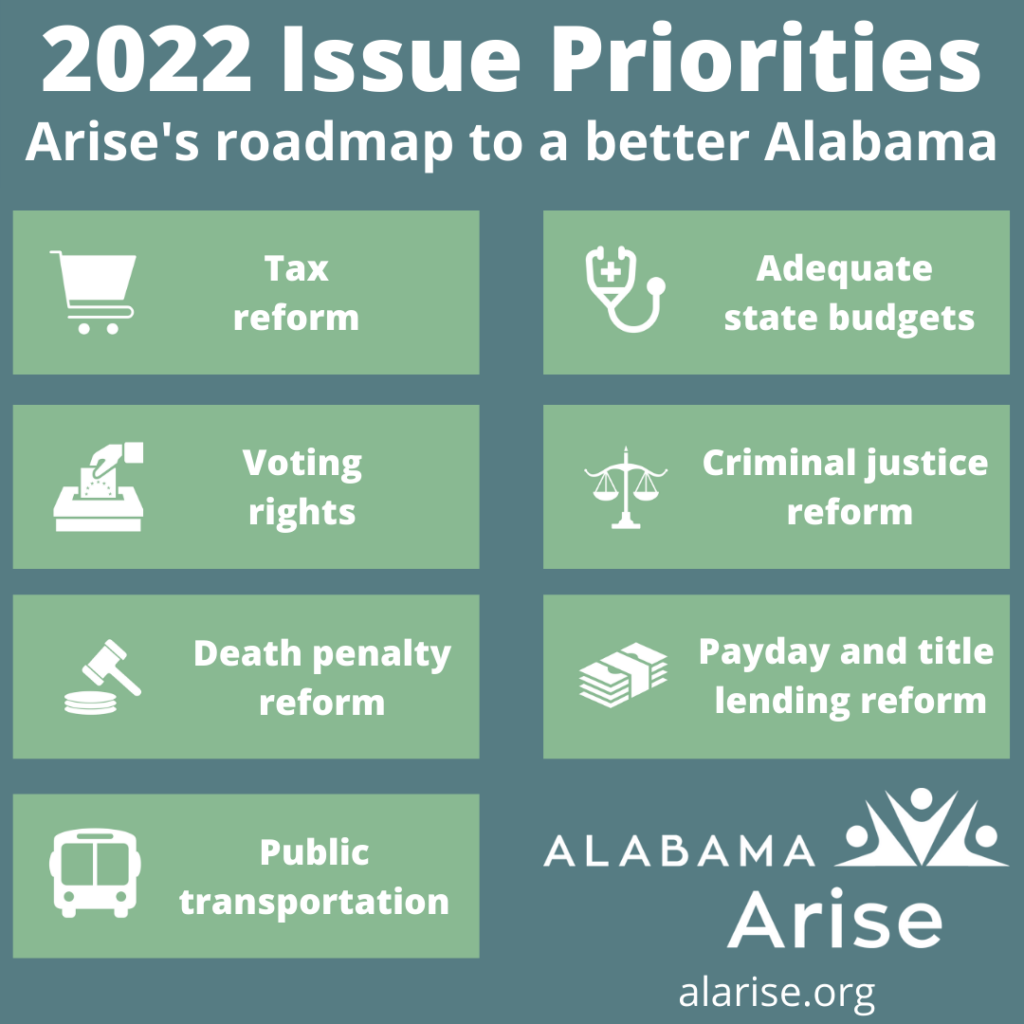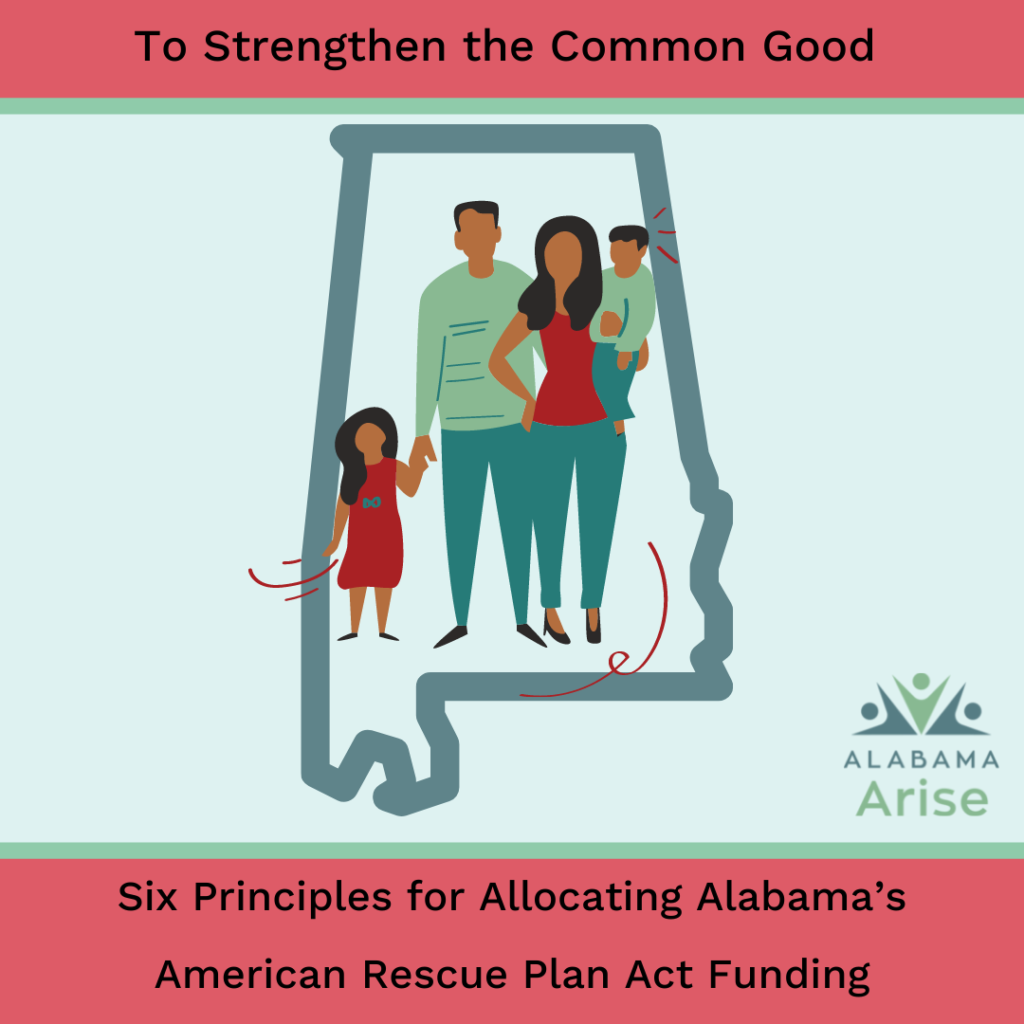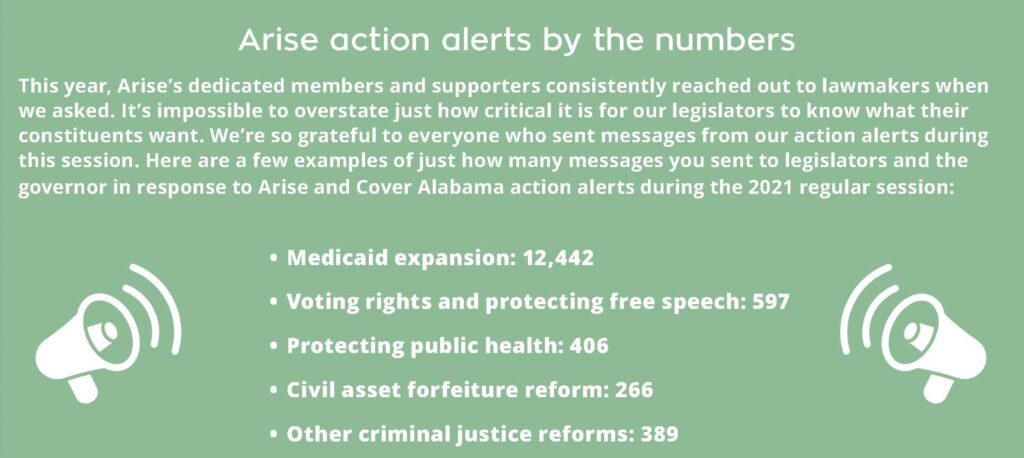Alabamians deserve a criminal justice system that treats people fairly when they are accused of crimes, rehabilitates people as quickly as possible and releases people once they’re ready to rejoin the community. But Alabama’s criminal justice system doesn’t meet those standards, and the state’s prisons are dangerous warehouses, not rehabilitation centers. Three inmates were murdered in a single five-day span just last month.
These murders occurred after the U.S. Department of Justice (DOJ) sued the state in December 2020, citing rampant inmate-on-inmate violence, guard-on-inmate violence and sexual assaults. More than two dozen people incarcerated in Alabama prisons have been murdered since the DOJ informed the state that prison conditions are unconstitutional. The Justice Department filed the ongoing lawsuit only after the state failed to take steps to fix the shortcomings outlined in the DOJ’s April 2019 report on the prison system’s failures.
Alabama’s prisons have been severely understaffed and operating well above their designed capacity for years. And too many state officials either have ignored the issues or actively made these problems worse. During former director Charlie Graddick’s tenure, the Bureau of Pardons and Paroles contributed to the overcrowding problem by sharply reducing the number of prisoners released under supervision.
Bureau of Pardons and Paroles problems are part of broader failure
Graddick’s replacement is former state Sen. Cam Ward, who took charge in December 2020. Ward sponsored a criminal justice reform package that passed in 2015 and worked toward other reforms while in the Legislature. Ward also served on Gov. Kay Ivey’s criminal justice study group two years ago.
This group made several concrete recommendations to improve conditions for people in Alabama prisons. Rep. Jim Hill, R-Odenville, a member of Ivey’s study group and chair of the House Judiciary Committee, sponsored several bills this year to implement some modest reforms endorsed by the study group. But none of Hill’s proposals became law. The legislation that Hill introduced included:
- HB 24 to allow resentencing for some people sentenced under the Habitual Felony Offender Act (HFOA).
- HB 71 to strengthen alternative court programs.
- HB 72 to ensure people don’t leave prison without reentry assistance through supervision.
- HB 73 to create community corrections programs in each judicial circuit.
- HB 110 to allow some inmates to serve sentences in county jail instead of prison.
- HB 520 to provide time credits for prisoners who complete education and training programs.
Defensive victory, significant incremental improvements build momentum
Several positive criminal justice bills did make it through the Legislature, and one particularly damaging proposal was stopped. HB 445, by Rep. Allen Treadaway, R-Morris, would have chilled free speech by expanding law enforcement’s powers to arrest people at protests like those after George Floyd’s murder by a Minneapolis police officer last year. The bill passed the House, but it stalled in the Senate.
This bill’s death was notable because several Black legislators were clear about its parallels to segregationist punishments of protest during the 1960s. That comparison helped drive home the point that HB 445 would have been a major policy mistake.
Among the positive reforms that passed was SB 117 by Coleman-Madison, which greatly expanded the availability of expungements. (The bill also increased the application fee by $200, however.) HB 106 by England will ensure the Alabama Department of Corrections transmits relevant data on operations to the Legislature. This measure will help erase the institutional secrecy that has contributed to current atrocious prison conditions.
In another significant victory for reform, the Legislature overwhelmingly passed SB 210 by Sen. Arthur Orr, R-Decatur. The bill restricts the use of civil asset forfeiture, an often abused practice that allows law enforcement to seize property without a criminal conviction. These forfeitures most heavily burden people who cannot afford to fight back against the seizures in court.
As originally introduced, SB 210 would have banned nearly all forfeitures without criminal convictions. But lawmakers significantly weakened the bill in the legislative process. Even so, SB 210 places some important limits on a subjective, racially biased practice that historically has had little oversight. The final, narrower version reins in abuses by exempting some property from forfeiture and strengthening protections for innocent owners.
Systemic change faced fierce opposition
Other broader attempts to remedy criminal justice issues died amid stiff, and sometimes loud, resistance from some legislators. Opposition by district attorneys blocked a proposal by Rep. Chris England, D-Tuscaloosa, to repeal the archaic, Habitual Felony Offender Act (HFOA), Alabama’s “three strikes” law. England’s effort to create a commission to study and evaluate fines and fees — HB 499 — likewise encountered delays until passage became impossible.
HB 129 by Rep. Chris Pringle, R-Mobile, would have eliminated the practice of suspending driver’s licenses for unpaid fines and fees. This bill, too, ran into repeated delays in the House. HB 544 by Rep. Neil Rafferty, D-Birmingham, which would have abolished the death penalty, also failed to move.
SB 118 by Sen. Linda Coleman-Madison, D-Birmingham, would have eliminated the requirement for people to repay fines and fees ‒ effectively a poll tax ‒ to regain their right to vote after release from prison. SB 118 passed the Senate but failed in the House Constitution, Campaigns and Elections Committee.
Small steps aren’t enough
The Legislature took several significant steps forward on criminal justice reform this session. But those steps still leave Alabama a great distance behind modern justice practices in many areas. The influential law enforcement lobby, especially in the House, acted as a roadblock to broader reforms to put the state on a path to a more just, sustainable and humane corrections system.
This refusal to act decisively and fix previous policy mistakes could come at a steep cost amid the DOJ lawsuit. Some of Ivey’s study group’s recommendations would alleviate overcrowding in prisons directly. Others would divert people away from imprisonment in the first place and into programs that would prevent them from ever setting foot in a prison.
As England noted two years ago when a bill to lessen sentences for marijuana convictions was killed, the state will have little room to argue it has attempted to alleviate overcrowding when the Legislature has dragged its feet on all major sentencing reforms in the past two sessions while the state is being sued over unconstitutional prison conditions.
Lawmakers know state prisons are dangerous and overcrowded. Their failure to fix these problems almost certainly will lead to more lives lost through more violence. The Legislature’s inaction also will lead to more lawsuits from people who are harmed by these policy failures. And depending on the DOJ lawsuit’s outcome, it could contribute to a complete federal takeover of state prisons.
A path forward for Alabama on criminal justice reform
The Legislature is likely to return for a special session later this year to deal with the issue of prison financing. Because the governor’s original $3 billion lease financing plan for new prisons failed, Alabama will need to find a new way of financing the cost for multiple new prisons if that remains the chosen infrastructure strategy.
But construction alone isn’t a cure for the problems of Alabama’s criminal justice system. To move the state forward toward lasting solutions, Ivey should include major reforms in her call for the special session. Those measures should include:
- Full repeal of the HFOA and resentencing of all people sentenced under its draconian provisions.
- Sentencing reductions for drug crimes and other nonviolent offenses.
- Major expansion of alternatives to prison.
- Significant efforts to reduce the economic damage that incarceration causes people. This should include greater investments in job training and community corrections, an end to driver’s license suspensions for reasons unrelated to traffic safety, and an end to policies that make voting rights restoration contingent on the payment of fines and fees.
Each murder, rape and assault in state prisons is partly attributable to the Legislature’s refusal to do its job. Further failure to act will only increase the human suffering and the eventual financial cost of enacting meaningful policy solutions.
Lawmakers have refused to address the dire conditions in Alabama’s prisons over the past two regular sessions. They must implement the improvements that have been in the works for years at the next available opportunity. Otherwise, they may lose the ability to make those choices when a federal court decides the state has too much blood on its hands and a stubborn unwillingness to fulfill its obligations on its own.





